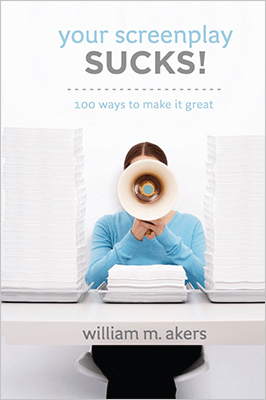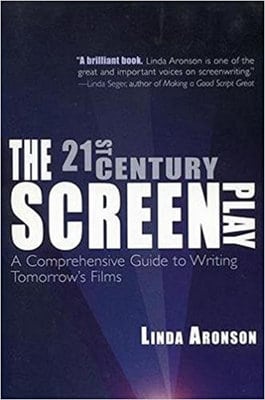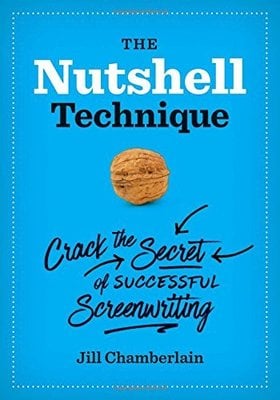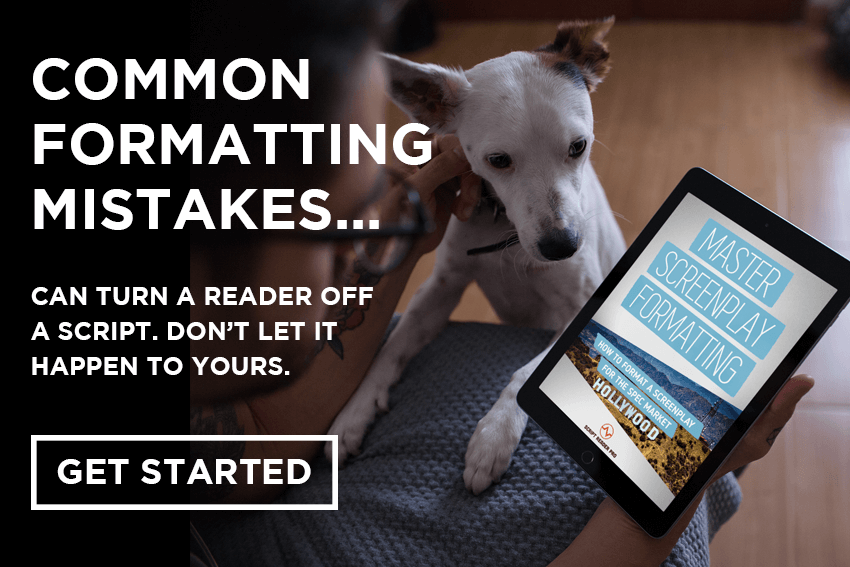The 10 best screenwriting books to read in 2020
The 10 best screenwriting books to read in 2020
If you’re an aspiring screenwriter with the goal of breaking into the industry, here are the best screenwriting books you should read.
The screenplay books on this list…
- Explain things in a clear, practical, no BS manner (much like our own style)
- Are maybe underrated and/or you may not have heard of
- Will transform your understanding of any given area of screenwriting
So, let’s get straight into the best screenwriting books to add to your reading list!
(Full disclosure: This post contains affiliate links, meaning if you buy a book we’ll get a small commission at no extra cost to you.)
Best screenwriting books #1: Your Screenplay Sucks! by William M. Akers.

Akers is a lifetime member of the Writers’ Guild of America and writer of three produced screenplays. This book is great for helping writers really get to grips with the essentials of the craft.
The subtitle to the book is “100 Ways To Make It Great” and it does just that. The chapters on editing sentences are particularly helpful. Especially if you’re one of the many writers who suffer from overwritingingus.
Why is it one of the best screenwriting books to read this year? Its no-nonsense approach that will make you see your writing style in a whole new light.
Best screenwriting books #2. The Coffee Break Screenwriter by Pilar Alessandra.

Pilar is the host of one of the best screenwriting podcasts out there, and now she’s written one of the best screenwriting books out there.
Her friendly but practical approach shines through in this really helpful screenwriting book aimed at those with 9-to-5 jobs and/or kids, who have trouble finding the time to sit down and write. As she says in the subheading, it’s all about writing ten minutes at a time. Highly recommended.
Why is it one of the best screenwriting books to read this year? The book is full of practical tools and exercises that you can run on your story that come in bite-sized ten-minute chunks.
Best scriptwriting books #3. The 21st Century Screenplay by Linda Aronson.

Whether you want to write short films, features, adaptations, genre films, ensemble films, blockbusters or art-house movies, this book takes you all the way from choosing an idea to plotting, writing and rewriting.
The 21st Century Screenplay is essential reading for new and veteran writers alike and definitely one of the best screenwriting books you should read.
Why is it one of the best screenwriting books to read this year? The book features a range of insider survival tips on time-effective writing, creativity under pressure and rising to the challenge of international competition.
Best scriptwriting books #4. The Nutshell Technique by Jill Chamberlain.

In this book, sought-after script doctor, Jill Chamberlain, focuses on one key fact: while many aspiring screenwriters can write snappy dialogue or create interesting characters, many fail to craft a compelling story.
Instead, they create a situation. Her “nutshell technique” shows you how to take an interesting situation and turn it into a story.
Why is it one of the best screenwriting books to read this year? It’s very hands-on (which we love) and uses a ton of examples from well-known, up-to-date movies. Such as how your protagonist’s “want” expressed at the beginning of Act 1 should be granted at the end of Act 1, but not in the way they expected…
Best screenwriting books #5. Getting It Write by Lee Jessup.

Out of all the screenwriting books on the market, very few address the problem many writers face once they’ve completed a great script: what the heck do I do with it now? That’s what Jessup tackles in this fantastic screenwriting book: how to market your screenplay (and yourself) in the industry.
While there’s no sure-fire formula to success, follow the pragmatic advice laid out in this book and you’ll be far ahead of the majority of other aspiring writers when it comes to starting a screenwriting career,
Why is it one of the best screenwriting books to read this year? Jessup is a highly sought-after authority in the industry who knows exactly how it works and what the best approaches are to break in and achieve your goals.
Best screenwriting books #6. On Writing by Stephen King.

Don’t let the fact that Stephen King writes novels rather than a screenplays put you off. This book is universally recognized as a classic text on the art of writing, regardless of medium.
The first half is a memoir detailing King’s journey from unknown writer to best-selling author. The second lays out his personal tips on how to write—95 percent of which is just as applicable to screenplays as to novels.
Why is it one of the best screenwriting books to read this year? King is a master of the craft of writing and packs this book with his very best advice on crafting characters, stories, dialogue, pacing, editing and much more.
Best scriptwriting books #7. Inside Story by Dara Marks.

Quite simply one of the best books on screenwriting theme there is. If you’re struggling with how to track your protagonist’s arc, this is definitely the book for you. In it, Marks reveals how the internal character development of the protagonist informs the overall story and theme.
Essential reading if you want to learn how to make your theme resonate via the hero’s journey.
Why is it one of the best screenwriting books to read this year? While other screenwriting books often include a chapter or section on theme, this one devotes a whole book to it. As theme is such an important (yet overlooked) element of writing a successful screenplay, this is definitely worth purchasing.
Best scriptwriting books #8. My Story Can Beat Up Your Story by Jeffrey Alan Schecter.

Did you know that act one in a screenplay has twelve very specific plot points? Many powerful story-telling techniques that Hollywood screenwriters have been using for decades are revealed in Schecter’s book.
A hidden gem and one of the best screenwriting books on the market on how to set up the core conflict in your script.
Why is it one of the best screenwriting books to read this year? Many screenwriting books rehash the same information on how to write in slightly different ways. This one, however, contains information you won’t find anywhere else.
Best screenwriting books #9. Save the Cat Strikes Back! by Blake Snyder.

There’s a whole series of Save The Cat screenwriting books and this second one is just as good, if not better than the first one. We think this is the best screenwriting book for understanding concepts and loglines that we’ve found anywhere.
Its section on how to come up with a rocking logline is exceptional. The rest of the book also includes gems such as “the difference between structure and formula” and “the 5-Point Finale” to finish a script.
Why is it one of the best screenwriting books to read this year? Much like the original Save the Cat book, this one is pretty inspiring and will show you how to find the greatness in any story.
Best screenwriting books #10. Into the Woods by John Yorke.

This book is by a British screenwriter so there are quite a few references to UK movies and TV shows you may not have heard of. Nevertheless, this is definitely one of the best screenwriting books to have come out in recent years.
Its focus is on story structure and storytelling as an art-form and will send you back to your script with a newfound sense of enthusiasm.
Why is it one of the best screenwriting books to read this year? As opposed to being a purely craft-based screenwriting book, this one takes the reader on a philosophical and psychological journey deep into the heart of storytelling.
Best screenwriting books: The classics.
If you’re wondering where Screenplay by Syd Field or Story by Robert McKee are, below you’ll find the classics found in most “best screenwriting books” lists that are also worth checking out if you haven’t already.
• The Art Of Dramatic Writing by Lajos Egri
• The Sequence Approach by Paul Joseph Gulino
Best screenwriting books: filmmaking.
We would also highly recommend reading more general books on the film industry and theory such as:
• Down and Dirty Pictures by Peter Biskind
In other words, you need to pretty much immerse yourself in the world of cinema, 24/7. Learn as much as you can through reading, not just the best scriptwriting books, but books about directing, editing and producing as well. It all helps.


Comments
Post a Comment